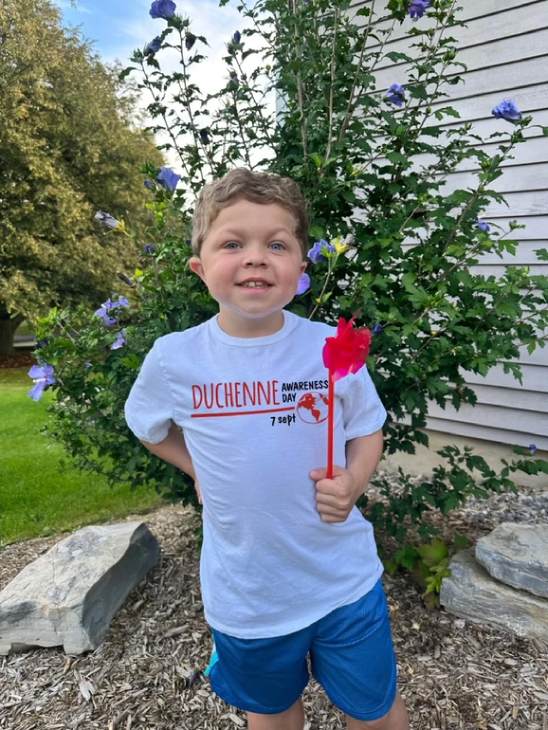MANLIUS, New York — When Charlie Prior’s second-grade teacher asked his class to illustrate how their family spent their summer, the 7-year-old didn’t hesitate to use the box of crayons in front of him to draw a picture of the fire tower his family climbed in the Adirondacks to overlook the mountain range in northeastern New York and the sun setting along the ocean at Cape Cod.
“I like to hike and I like the top of mountains,” Charlie wrote in the first picture, adding in the second one of the ocean, “I like to listen to the waves … play in the ocean, in the sand, and run at the ocean.”
Pretty normal stuff for a healthy 7-year-old boy. But Charlie has Duchenne muscular dystrophy, a rare genetic disease that leads to progressive muscle degeneration and weakness throughout the body, essentially robbing a boy — it almost always only affects males — of the ability to hike, fish, climb a fire tower, run in the sand or swim in the ocean.
That he is hiking and climbing is nothing short of a miracle.

His mother Cheryl Prior said this summer was the best of his young life, all thanks to a breakthrough treatment by the biopharmaceutical company Sarepta that gets at the root of Duchenne muscular dystrophy: the boys’ bodies’ inability to make dystrophin, the glue that holds muscle fibers together.
For decades this gene therapy has been the goal of the tightknit Duchenne muscular dystrophy community. Sarepta finally got the drug approved by the FDA this year.
Cheryl, whose family includes her husband Charles, her 11-year-old son Noah, and Charlie, said so far, Charlie has had two infusions, double-blinded and placebo-controlled, which took place in January 2022 and January 2023.
“About eight weeks after his second infusion, we started to see significant improvements in his mobility and overall happiness. These changes have substantially improved Charlie’s life with a new sense of independence and self-confidence! And we are continuing to see him improve,” she said. Since his diagnosis, the Prior family has been deeply involved in Parent Project Muscular Dystrophy, the largest and most comprehensive nonprofit organization in the U.S. focused entirely on Duchenne muscular dystrophy.

Prior said that includes raising awareness and funds for Coach to Cure — the annual college football event where coaches nationwide wear patches on their sleeves in support of Coach to Cure MD on the last Saturday in September.
“In 2019, we participated in Coach to Cure at Syracuse University. It was wonderful to go on the field in the JMA Dome and receive a signed football from the Syracuse head football coach,” she said.
Saturday, Sept. 30, marks the 16th year where you will see AFCA coaches nationwide wearing armbands and mentioning Coach to Cure MD during on- and off-field interviews. The partnership began because of the unique parallels between Duchenne muscular dystrophy and a game where young men are at the peak of their muscular strength.
The emotion the coaches, players and children like Charlie exhibit when they are embraced by the team and the crowd and are for a moment part of the action is a sight to behold.
Prior said everything about her pregnancy leading up to the birth of Charlie in 2015 was normal. At the age of 3, the Priors said they noticed some signs of developmental delay, so they took their son to receive treatment with a physical therapist and speech therapist. “After only a few sessions, Charlie’s physical therapist noticed a substantial delay in body awareness, postural control, and core muscle strength. He could not jump or use stairs without assistance.”
His delays were significant enough that she believed he needed further evaluations performed.
“We acted immediately, reaching out to our pediatrician. Soon after that, our pediatrician called for a blood test to check his creatine kinase enzyme level,” Prior explained.
It was then they were made aware that Charlie showed the symptoms of a child with Duchenne muscular dystrophy, and because there was a family history of the disease, the odds were not in Charlie’s favor.
Within 48 hours, he was diagnosed.
“Hearing those words turned our world upside down. Nothing would ever be the same again. Our lives together now divided into two parts, before DMD and after DMD,” Prior said.
Prior said they are so grateful to PPMD for their commitment to groundbreaking research and successful advocacy work on Capitol Hill, which led to clinical trials and approved therapies and his success participating in them.
Without them, he might not have been able to draw such inspirational pictures for his teacher.
Despite the terror that an incurable disease brings to a family, something else happens that is more powerful and much easier to hold on to, Prior said, and that is love.
“Through Charlie’s eyes, love stares back at us and reminds us to be thankful for all we have right now. Our hearts are full of love, hope, faith, and positivity, and our focus is on our life experiences together and getting the best possible care for our son,” she said.
Salena Zito is a CNN political analyst and a staff reporter and columnist for the Washington Examiner. She reaches the Everyman and Everywoman through shoe-leather journalism, traveling from Main Street to the beltway and all places in between. To find out more about Salena and read her past columns, please visit the Creators Syndicate webpage at www.creators.com.








Join the conversation as a VIP Member